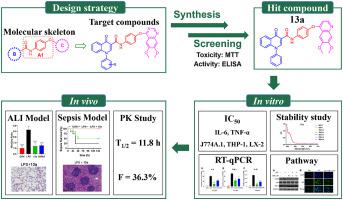European Journal of Medicinal Chemistry ( IF 6.0 ) Pub Date : 2023-01-23 , DOI: 10.1016/j.ejmech.2023.115144 Jun Yang 1 , Minxiu Wang 1 , Yulan Xu 1 , Jing Liao 1 , Xiang Li 1 , Ying Zhou 1 , Jintian Dai 2 , Xiaobo Li 1 , Pan Chen 3 , Gaozhi Chen 1 , Won-Jea Cho 4 , Nipon Chattipakorn 5 , Aleksandr V Samorodov 6 , Valentin N Pavlov 6 , Yi Wang 1 , Guang Liang 7 , Qidong Tang 8

|
Acute lung injury (ALI) and sepsis, characterized by systemic inflammatory response syndrome, remain the major causes of death in severe patients. Inhibiting the release of proinflammatory cytokines is considered to be a promising method for the treatment of inflammation-related diseases. In this study, a total of 28 4-oxo-N-phenyl-1,4-dihydroquinoline-3-carboxamide derivatives were designed and synthesized and their anti-inflammatory activities in J774A.1 were evaluated. Among them, derivative 13a was found to significantly inhibit lipopolysaccharide (LPS)-induced expression of the proinflammatory cytokines interleukin-6 (IL-6) and tumor necrosis factor-α (TNF-α) on J774A.1, THP-1 and LX-2 cells, and inhibited the activation of the NF-κB pathway. Furthermore, administration of 13a in vivo significantly improved the symptoms in LPS-induced ALI mice, including alleviation of pathological changes in the lung tissue, reduction of pulmonary edema, and inhibition of macrophage infiltration. Moreover, the administration of 13a in vivo significantly promoted survival in LPS-induced sepsis mice. 13a demonstrated favorable pharmacokinetic properties with T1/2 value of 11.8 h and F value of 36.3%. Therefore, this study has identified a novel 4-oxo-N-phenyl-1,4-dihydroquinoline-3-carboxamide derivative, 13a, which is an effective anti-inflammatory agent. The findings have laid a foundation for the further development of agents to treat ALI and sepsis.
中文翻译:

发现 4-oxo-N-phenyl-1,4-dihydroquinoline-3-carboxamide 衍生物作为治疗急性肺损伤和败血症的新型抗炎药
以全身炎症反应综合征为特征的急性肺损伤(ALI)和败血症仍然是重症患者死亡的主要原因。抑制促炎细胞因子的释放被认为是治疗炎症相关疾病的一种有前途的方法。本研究共设计合成了 28 个 4-oxo- N -phenyl-1,4-dihydroquinoline-3-carboxamide 衍生物,并评价了它们在 J774A.1 中的抗炎活性。其中,衍生物13a被发现可显着抑制脂多糖 (LPS) 诱导的 J774A.1、THP-1 和 LX 上促炎细胞因子白细胞介素 6 (IL-6) 和肿瘤坏死因子-α (TNF-α) 的表达-2 细胞,并抑制 NF-κB 通路的激活。此外,管理13a 在体内显着改善 LPS 诱导的 ALI 小鼠的症状,包括减轻肺组织的病理变化、减轻肺水肿和抑制巨噬细胞浸润。此外,体内施用13a 可显着促进 LPS 诱导的脓毒症小鼠的存活。13a显示出良好的药代动力学特性,T 1/2值为 11.8 h,F 值为 36.3%。因此,本研究确定了一种新型 4-oxo- N -phenyl-1,4-dihydroquinoline-3-carboxamide 衍生物13a,它是一种有效的抗炎剂。这些发现为进一步开发治疗 ALI 和脓毒症的药物奠定了基础。






























 京公网安备 11010802027423号
京公网安备 11010802027423号